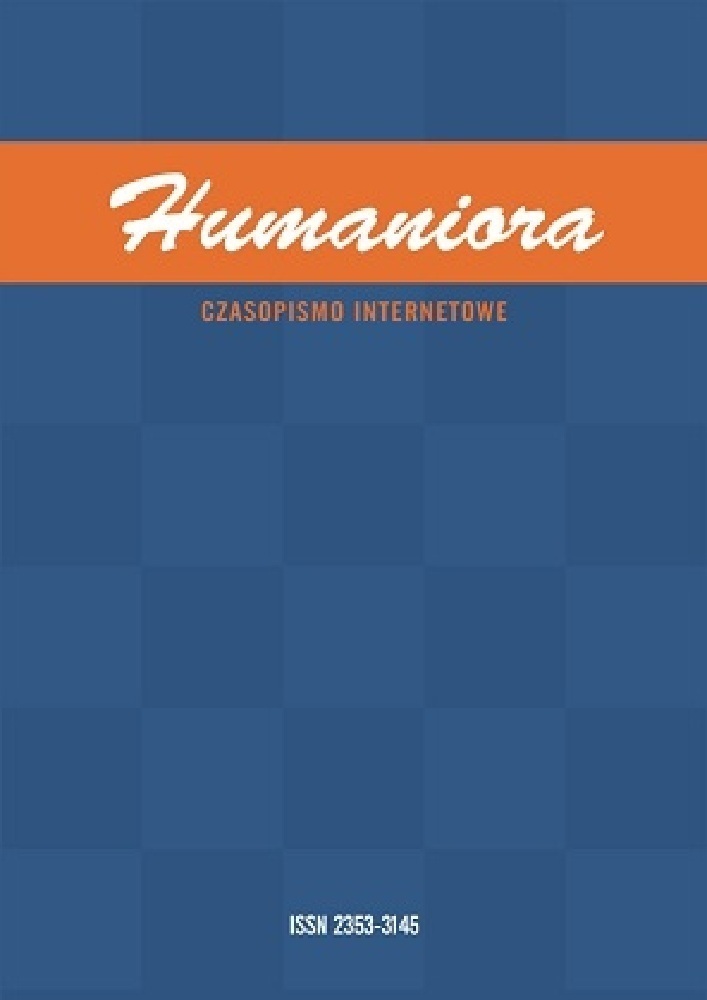Abstrakt
The aim of this article is to examine whether there are connections between the wisdom literature of Ancient Egypt and Neoplatonic political philosophy. Using the definitione of political philosophy proposed by Dominic O’Meara, I try to show that Egyptian texts meet this definition. I then compare Neoplatonic political philosophy and Egyptian wisdom literature, showing similarities and common elements. In the rest of the article, I hypothesize that common threads with Egyptian texts may depend on Egyptian thought. At the end of the article I conclude that the fact that Plotinus’ teacher was Ammonius Saccas may explain this.
Bibliografia
Asante M.K., The Egyptian Philosophers: Ancient African Voices from Imhotep to Akhenaten, seria „African American Images”, Gilbert, 2000.
Benz E., Indische Einflüsse auf die frühchristliche Theologie, „Abhandlungen der Geistes- und Sozialwissenschaftlichen Klasse” Jahrgang 1951, Nr. 3.
Czabanowski W., Aksjologia urzędników Średniego Państwa na podstawie Nauk Dua-Khety, „Studia Antyczne i Mediewistyczne” 2016, nr 14[49], Wydawnictwo Naukowe Uniwersytetu Mikołaja Kopernika, Wydawnictwo IFIS PAN, Warszawa.
Czabanowski W., Filozofia polityczna starożytnego Egiptu w Naukach dla króla Merikare, „Przegląd Filozoficzny – Nowa Seria” 2017, R. 26, nr 1(101), red. B. Dziobkowski, Komitet Nauk Filozoficznych PAN, Wydział Filozofii i Socjologii Uniwersytetu Warszawskiego, Warszawa.
Czabanowski W., Filozofia prawa i prawo proceduralne w „Opowieści o elokwentnym wieśniaku”, „Krakowskie Studia z Historii Państwa i Prawa” 2016, t. 9, z. 4, red. D. Malec, W. Uruszczak, M. Mikuła, K. Górski, Wydawnictwo Uniwersytetu Jagiellońskiego, Kraków. DOI: https://doi.org/10.4467/20844131KS.16.023.6323
Czabanowski W., Maksymy wezyra Ptahhotepa – wyraz ideologii klasy urzędniczej okresu Starego Państwa, „Kwartalnik Filozoficzny” 2015, t. XLIII, z. 3, red. W. Stróżewski, Polska Akademia Umiejętności Uniwersytet Jagielloński, Kraków.
Czabanowski W., Na czym polega zmiana? Filozoficzna zawartość Lamentacji Ipuwera, Proroctwa Neferti, Instrukcji Amenemhata i Lamentacji Khakheperre-Sonbe, „Studia Antyczne i Mediewistyczne” 2019, nr 17[52], Wydawnictwo Naukowe Uniwersytetu Mikołaja Kopernika, Wydawnictwo IFIS PAN, Warszawa. DOI: https://doi.org/10.37240/saim.2019.17.52.1
Hindley J.C., Ammonios Sakkas. His Name and Origin, w: Zeitschrift für Kirchengeschichte, vol. 75, eds. T. Brieger, B. Bess, W. Kohlhammer Verlag, 1964.
Lichtheim M., Ancient Egyptian Literature, vol. I: The Old and Middle Kingdoms, University of California Press, London 2006. DOI: https://doi.org/10.1525/9780520933057
Lichtheim M., Ancient Egyptian Literature, vol. II: The New Kingdom, University of California Press, London 2006. DOI: https://doi.org/10.1525/9780520933064
Liu J., Wprowadzenie do filozofii chińskiej, Wydawnictwo Uniwersytetu Jagiellońskiego, Kraków 2010.
McCown C.C., Hebrew and Egyptian Apocalyptic Literature, „The Harvard Theological Review” 1925, vol. 18, no. 4, Cambridge University Press w imieniu Harvard Divinity School. DOI: https://doi.org/10.1017/S0017816000007550
Mozley J.R., Ammonius Saccas, w: Dictionary of Early Christian Biograph, London 1911.
Nederhof M.J., Eloquent peasant, 2006.
O’Meara D.J., Platonopolis, Oxford University Press, Oxford 2005.
Obenga T., Egypt: Ancient History of African Philosophy, w: A Companion to African Philosophy, ed. K. Wiredu, Blackwell Publishing Ltd 2005. DOI: https://doi.org/10.1002/9780470997154.ch2
Reale G., Historia filozofii starożytnej, t. I: Od początków do Sokratesa, Wydawnictwo KUL, Lublin 2005.
Schwyzer H.R., Ammonios Sakkas, der Lehrer Plotins, w: Rheinisch-Westfalische, Akademie der Wissenschaften, Westdeutscher Verlag 1981.
Seeberg E., Ammonius Sakas, w: Zeitschrift für Kirchengeschichte, vol. 61, 1942.
Smith W.S., The Relationship between Egyptian Ideas and Old Testament Thought, „Journal of the American Academy of Religion” 1951, vol. 19, no. 1, Oxford Academic. DOI: https://doi.org/10.1093/jaarel/XIX.1.12
Tobin V.A., The Maxims of Ptahhotep, w: The Literature of Ancient Egypt, ed. W. K. Simpson, Yale University Press/New Haven & London 2003.
Tobin V.A., The Tale of the Eloquent Peasant, w: The Literature of Ancient Egypt, ed. W.K. Simpson, Yale University Press, New Haven & London 2003.
Tobin V.A., The Teaching for King Merikare, w: The Literature of Ancient Egypt, ed. W.K. Simpson, Yale University Press/New Haven & London 2003.
Uždavinys A., Philosophy as a Rite of Rebirth, The Prometheus Trust 2008.
Uždavinys A., The Heart of Plotinus, World Wisdom, Inc. 2009.
Volten A., Zwei altägyptische politische Schriften: Die Lehre für König Merikare (Pap. Carlsberg VI) und Die Lehre des Königs Amenemhet, w: Analecta Aegyptiaca, Consilio Instituti Aegyptologici Hafniensis Edita, Einar Munksgaard, Kopenhaga 1945.
Wallis R.T., Phraseology and Imagery in Plotinus and Indian Thought, w: Neoplatonism and Indian Thought, Studies in Neoplatonism: ancient and modern, vol. II, ed. R. Baine Harris, State University of New York Press 1982.
Williams R. J., The Sages of Ancient Egypt in the Light of Recent Scholarship, „The Journal of American Oriental Society” 1981, vol. 101, American Oriental Society. DOI: https://doi.org/10.2307/602161
Žaba Z., Les Maximes de Ptahhotep, Československa Akademie Vĕd, Praga 1956.
Голунский С.А., Строгович М.С., Теория государства и права. Юридическое издательство, НКЮ СССР, Москва 1940.
Anakwue N.Ch., The African origins of Greek philosophy: Ancient Egypt in retrospect, „Phronimon” 2017, no. 18, https://upjournals.co.za/index.php/Phronimon [dostęp: 25.12.2023]. DOI: https://doi.org/10.2139/ssrn.3134513
Dillon J.M., Plotinus at Work on Platonism, „Greece & Rome” 2009, vol. XXXIX, no. 2, Cambridge University Press, https://tiny.pl/41z9fqr9 [dostęp: 26.12.2023].
Herbjørnsrud D., The Radical Philosophy of Egypt: Forget God and Family, Write!, Blog of the American Philosophical Association, 17 grudnia 2018, https://blog.apaonline.org/2018/12/17/the-radical-philosophy-of-egypt-forget-god-and-family-write/ [dostęp 25.12.2023].
https://mjn.host.cs.st-andrews.ac.uk/egyptian/texts/corpus/pdf/Peasant.pdf, [dostęp 25.12.2023].
https://www.perseus.tufts.edu/hopper/text?doc=Perseus%3atext%3a1999.01.0143%3aspeech%3d11 [dostęp 25.12.2023].
https://www.perseus.tufts.edu/hopper/text?doc=Perseus:text:1999.01.0174:text=Phaedrus:section=274d, [dostęp 25.12.2023].
Locating and Debating Precolonial African Philosophy, History of Philosophy without any gaps, 2018, https://historyofphilosophy.net/africana/precolonial-african-philosophy, [dostęp 20.06.2019].
Platon, Timajos, Perseus Digital Library, red. G. R. Crane, sekcja 21e, https://www.perseus.tufts.edu/hopper/text?doc=Perseus%3Atext%3A1999.01.0179%3Atext%3DTim.%3Asection%3D21e [dostęp: 25.12.2023].
Licencja
Prawa autorskie (c) 2025 Wojciech Wilhelm Zhang-Czabanowski

Utwór dostępny jest na licencji Creative Commons Uznanie autorstwa – Bez utworów zależnych 4.0 Międzynarodowe.
Czasopismo oraz wszystkie zamieszczone w nim materiały są powszechnie dostępne i mogą być wykorzystywane do celów naukowych, edukacyjnych, poznawczych i niekomercyjnych bez konieczności uzyskiwania każdorazowej zgody autorów i redakcji. Nadesłanie artykułu do publikacji traktowane jest jako zgoda autora na udostępnienie swojej pracy i informacji w niej zawartych do powyżej wymienionych celów. W takich przypadkach należy jedynie wskazać źródło, z którego zaczerpnięte zostały informacje. Pobieranie opłat za dostęp do materiałów zawartych w czasopiśmie lub ograniczanie do niego dostępu jest zabronione.
Przesyłane do redakcji teksty muszą stanowić oryginalne prace, uprzednio nigdzie niepublikowane ani nie przedkładane innym redakcjom lub wydawcom. Autorzy nadsyłanych artykułów ponoszą odpowiedzialność za uzyskanie zezwoleń na publikowanie materiałów, do których prawa autorskie są w posiadaniu osób trzecich. Publikacja materiałów chronionych prawem autorskim jest możliwa pod warunkiem uprzedniego dostarczenia przez autora do redakcji pisemnej zgody właściciela praw autorskich.





